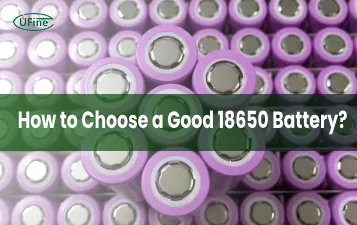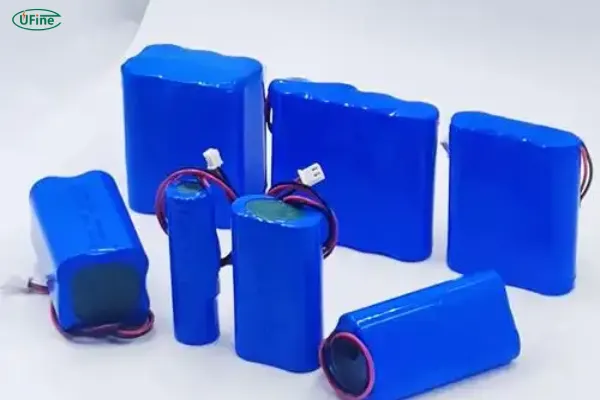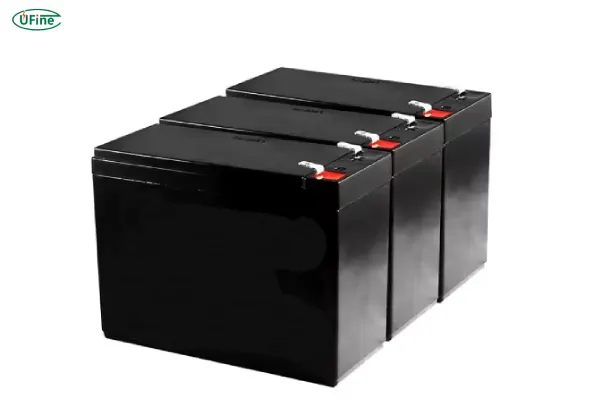Part 1. Why 10 volts? Understanding the significance of 10V batteries
A 10 volt battery offers a balanced solution between power and energy efficiency, especially for light to medium-power applications. Unlike 12V systems, which are typically used for high-demand appliances, 10V batteries provide sufficient power while being more compact, lightweight, and cost-effective.
These batteries are commonly chosen for devices that don’t require the heavy power output of a 12V battery, making them a great fit for smaller electronics, electric bikes, and solar energy storage.
At Ufine Battery, we specialize in providing custom 10V lithium batteries tailored to meet the specific energy requirements of your projects, ensuring an optimal balance of power, size, and efficiency.
Part 2. What’s the difference between 10V and 10.8V batteries?
The key difference between 10V and 10.8V batteries lies in their nominal voltage and peak voltage:
10V Battery: Typically, this type has a nominal voltage of 10V, but can reach up to 12V when fully charged. It offers a consistent power output over the course of the charge cycle and is ideal for systems requiring a stable, moderate power source.
10.8V Battery: A 10.8V battery (commonly used in Li-ion technology) has a nominal voltage of 10.8V, with a peak voltage of up to 12.6V when fully charged. The higher peak voltage makes these batteries slightly more efficient at the top end but can experience a steeper voltage drop as the charge depletes.
Choosing between 10V and 10.8V depends on your application’s power requirements. Ufine Battery can provide both 10V and 10.8V lithium options to suit your needs, whether for electric vehicles, solar power systems, or other specialized devices.
Part 3. Types of 10 volt batteries
When considering a 10V battery, it’s crucial to understand the different types available and how they impact performance, efficiency, and longevity. Here are the main types:
1. 10V Lithium-Ion (Li-ion) Batteries
- Energy Density: High
- Lifespan: 5-10 years
- Applications: Electric bicycles, small electronic devices, power tools.
- Advantages: Lightweight, fast charging, long cycle life, and high thermal stability. Perfect for compact, energy-efficient designs.
2. 10V Lithium Iron Phosphate (LiFePO4) Batteries
- Energy Density: Moderate (compared to Li-ion)
- Lifespan: 5-10 years
- Applications: Off-grid solar systems, energy storage.
- Advantages: Safety, high thermal stability, and longer life cycles. Ideal for higher-powered applications where safety and longevity are critical.
3. 10V Nickel-Metal Hydride (NiMH) Batteries
- Energy Density: Moderate
- Lifespan: 3-5 years
- Applications: Medical devices, hybrid vehicles.
- Advantages: More environmentally friendly and stable than NiCd batteries. However, they have a lower energy density compared to Li-ion batteries.
Part 4. Choosing the right charger for a 10 volt battery
Selecting the right charger for your 10V battery is crucial for maximizing performance and ensuring long battery life. Here are key considerations:
1. Battery Type Compatibility
Make sure the charger is designed for your battery’s specific chemistry—whether it’s Li-ion, LiFePO4, or NiMH. Mismatched chargers can lead to overcharging or undercharging, potentially damaging your battery.
2. Charging Speed and Voltage
For 10V lithium batteries, you’ll typically need a charger that outputs a voltage range of about 12.6V when fully charged. Ensure the charger matches this specification to ensure safe and efficient charging.
3. Battery Management System (BMS)
The BMS in 10V lithium-ion batteries is designed to protect the battery from overcharging, overheating, and over-discharging. Ensure that both your charger and battery support the BMS to maintain optimal health.
Part 5. Applications
10V batteries are used in a wide range of applications, where compactness, energy efficiency, and manageable power output are required. These include:
Electric Bicycles (E-Bikes): 10V lithium batteries are a common choice for e-bikes. They provide adequate range and power, offering an ideal balance between weight and energy efficiency.
Solar Power Systems: 10V lithium batteries are often used in small-scale solar energy storage, where compact and lightweight solutions are crucial.
Power Tools and Gadgets: Devices like cordless drills, flashlights, and other portable electronics use 10V batteries for reliable, efficient performance.
Consumer Electronics: Many wireless speakers, tablets, and handheld devices utilize 10V rechargeable batteries for a consistent power supply.
Part 6. Is a 10 volt battery rechargeable?
Yes, most 10V batteries, especially those based on lithium-ion and LiFePO4 technologies, are rechargeable. These batteries can typically go through 500-1000 charge cycles with proper care, making them cost-effective and environmentally friendly options for energy storage.
However, it’s essential to use a charger that is specifically designed for 10V batteries to prevent issues like overcharging or undercharging, which could shorten the battery’s lifespan.
Part 7. Where can you buy a 10 volt battery?
You can purchase 10V batteries from various online retailers and battery suppliers. For those looking for high-quality, customized solutions, Ufine Battery specializes in custom lithium batteries. Whether you need a 10V battery for your electric bike, solar power setup, or any other specialized application, we provide tailored solutions that meet your exact requirements.
Part 8. FAQs
-
Can I use a 10V battery in place of a 12V battery?
While you technically can, a 10V battery will not provide the same energy output as a 12V battery and may not function effectively in devices designed specifically for 12V systems. -
How long will a 10V battery last?
The lifespan of a 10V lithium battery typically ranges from 5 to 10 years, depending on the usage, charging habits, and battery type. LiFePO4 batteries tend to have a longer lifespan compared to Li-ion. -
How do I know if my 10V battery is dead?
If your 10V battery fails to hold a charge or drops significantly in voltage (e.g., below 8V), it may be time to replace it.
-
What is the best charger for a 10V lithium battery?
It is essential to choose a charger that is compatible with the specific battery chemistry (e.g., Li-ion or LiFePO4) and is designed to provide a charge voltage of around 12.6V. -
How can I maintain my 10V battery for optimal performance?
To ensure long battery life, avoid deep discharges, store your battery in a cool, dry place, and use the appropriate charger for your battery’s chemistry.
Related Tags:
More Articles

Top Features of a Good 18650 Battery You Should Know
Learn what makes a good 18650 battery and how to choose the best one for your device. Includes safety tips, top brands, and usage recommendations.
Understanding the Types of NCR18650 Batteries
Explore NCR18650 battery types in-depth. Compare models like B, GA, PF, and BD, and learn their chemistry, specs, uses, and safety features.
Curved Battery Pack vs. Flat Battery Pack: A Comprehensive Comparison for Flexible Electronics
Curved battery packs vs flat: compare flexibility, use cases, and performance to choose the right power source for modern electronic devices.
Where to Buy 3.7 V Lithium Ion Battery 850mAh Nearby?
Where to buy a 3.7 V lithium-ion battery 850mAh nearby? Learn specs, how to choose the right one, and where to buy it fast from nearby or direct from makers.
CR123A 3.0 V Lithium Battery vs 16340 Battery: Difference explained
CR123A and 16340 batteries look alike but differ in voltage, safety, and use. Learn the key differences to choose the right one for your device.





